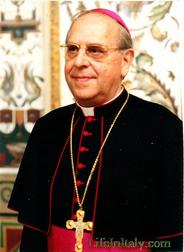
Archbishop Antonio Maria Vegliò, president of the Pontifical Council for the Pastoral Care of Migrants and Itinerant Peoples, published a letter today for World Tourism Day addressing the theme of "Tourism and Biodiversity" as proposed by the World Tourism Organization; the theme of "International Year for Biological Diversity" was adopted by the General Assembly of the United Nations in 2006. As Archbishop Vegliò noted, "This proclamation was born of the deep concern for 'the social, economic, environmental and cultural implications of the loss of biodiversity, including negative impacts on the achievement of the Millennium Development Goals, and stressing the necessity to adopt concrete measures in order to reverse it.'"
This
particular Council, according to the 1987 Apostolic Constitution Pastor Bonus,
has as its work the "pastoral solicitude of the Church to the particular needs
of those who have been forced to abandon their homeland, as well as to those
who have none" (149) and "is committed to assuring that journeys undertaken for
reasons of piety, study or relaxation may aid in the moral and religious
formation of the faithful; It assists particular Churches so that all those who
are far from home may be given adequate pastoral assistance (151). It also
oversees the Apostleship of the Sea.
The Church intensively cares for, is present to, the welfare of her children, indeed, she wants the happiness of all peoples, regardless of people's particulars. Why are these paragraphs important to me and perhaps to you? Because Archbishop Vegliò focuses our attention on the creative action of God in making the world ex nihilo and that He sustains us. I don't believe the Church is being politically correct in advocating "green theology" because it is fashionable. And, I don't think it would be acceptable to be dismissive of matters pertaining to the environment; whether we realize it or not, proper balance and respect for the environment is necessary for us today and in the future. This is why I think that dioceses, parishes, monasteries and school --in short, all constituencies-- ought to incorporate in their pastoral programs a proper catechesis on various subjects that promote and develop an environmental perspective. Catholics ought to take charge in being environmentally sensitive because of our fundamental belief that God is the creator of world, it is Scripturally well-founded, that God is the creator of us personally and because we care for all things that allow our humanity to thrive; and not least is the fact that all things are given for sustaining our life and giving glory to God. In other words, we really can't opt out of caring for the environment and calling those who abuse the environment on the micro and macro levels to be accountable. I wonder if one can argue that it is a mortal sin to abuse the environment. Respect for our biodiversity is not only a matter of faith and reason but our faith and good public order.
Nevertheless, Vegliò shows us that the Church is providing leadership for an authentic environmental perspective and goal that is truly human and humane. All our work should be balanced, reasonable and sustainable for the common good.
Some pertinent paragraphs of Archbishop Vegliò's letter follows:
As Pope Benedict XVI points out in his Encyclical letter Caritas in veritate, "in nature, the believer recognizes the wonderful result of God's creative activity, which we may use responsibly to satisfy our legitimate needs, material or otherwise, while respecting the intrinsic balance of creation" (48) and whose use represents for us "a responsibility towards the poor, towards future generations and towards humanity as a whole" (49). For this tourism must be respectful of the environment, looking to reach a perfect harmony with creation, so as to guarantee the sustainability of the resources on which it depends, while not leading to irreversible ecological transformations.

Contact with nature is important and therefore tourism must make an effort to respect and value the beauty of creation, from the conviction that "many people experience peace and tranquility, renewal and reinvigoration, when they come into close contact with the beauty and harmony of nature. There exists a certain reciprocity: as we care for creation, we realize that God, through creation, cares for us" (Benedict XVI, World Day of Peace 2010 message, 13).
There is an element that makes even this effort more imperative than ever. In the search for God, the human being discovers ways to bring himself closer to the Mystery, which has creation as a starting point (CCC 31). Nature and biological diversity speak to us of God Creator, He that makes himself present in His creation, "for from the greatness and the beauty of created things their original author, by analogy, is seen (Wis. 13:5), "for the original source of beauty fashioned them." (Wis. 13:3) This is why the world, in its diversity, "presents itself before man's eyes as evidence of God, the place where his creative, providential and redemptive power unfolds" (CSD 487) For this reason, tourism, bringing us closer to creation in its variety and wealth, can be an occasion to promote and increase the religious experience.
All of this makes looking for a balance between
tourism and biological diversity, in which they mutually support each other,
urgent and necessary, so that economic development and environmental protection
do not appear as opposed and incompatible elements, but rather that there is a
tendency to reconcile the demands of both (CSD 470).


Leave a comment